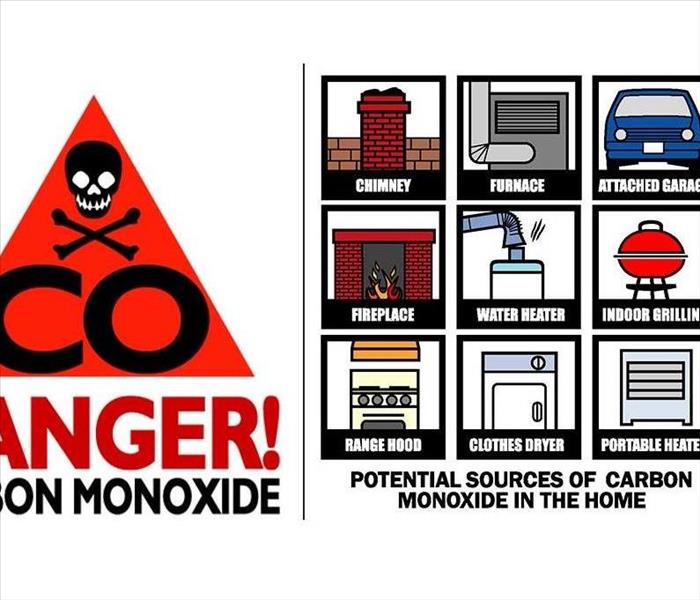CARBON MONOXIDE SAFETY TIPS
11/6/2017 (Permalink)
Install Carbon Monoxide Alarms
- Make sure your home has a carbon monoxide alarm. If you don’t have one, please go out and get one.
- As with smoke alarms, make sure you have a carbon monoxide alarm on every level of your home, especially near sleeping areas, and keep them at least 15 feet away from fuel-burning appliances.
- You won’t know that you have a carbon monoxide leak without a working alarm. So test alarms regularly and replace them every five to seven years depending on the manufacturer’s label.
- For the best protection, have carbon monoxide alarms that are interconnected throughout the home. When one sounds, they all sound.
- Carbon monoxide alarms are not substitutes for smoke alarms, and vice versa. Combination smoke and carbon monoxide alarms are available.
Understand How Carbon Monoxide Can Be Harmful
- Don’t use a grill, generator or camping stove inside your home, garage or near a window.
- If you need to warm a vehicle, remove it from the garage immediately after starting it. Don’t leave a car, SUV or motorcycle engine running inside a garage, even if the doors are open.
- Never use your oven or stovetop to heat your home.
- On the outside of your home, make sure vents for the dryer, furnace, stove and fireplace are clear of snow and other debris.
- Carbon monoxide can accumulate in or around your motorboat, so install an alarm on your boat.
Leave the House If the Alarm Sounds
- If the alarm goes off, immediately go outdoors or to an open window or door for some fresh air. Make sure that everyone inside your home is safe.
- Call 911 or the fire department. Stay outside or by an open window until emergency personnel arrive to assist you.
Store Gasoline Properly
- If using gasoline-powered devices, store gasoline in a locked location where children cannot access it. Keep only small quantities in an approved container that has child safety features.
- Keep gasoline away from any source of heat, spark or flame. Even common household appliances such as water heaters and clothes dryers can start a gasoline fire. Be sure to store your gasoline away from anything that could ignite it.
- Store gasoline in a well-ventilated area outside your vehicle and living space. The safest place to store the container is in a detached garage or shed.
- Never mix gasoline with fire. There is no safe way to start a fire with gasoline.






 24/7 Emergency Service
24/7 Emergency Service